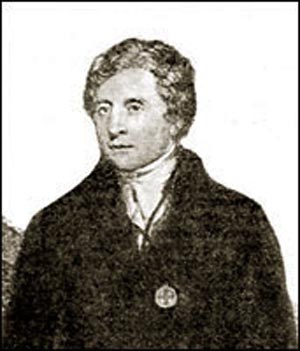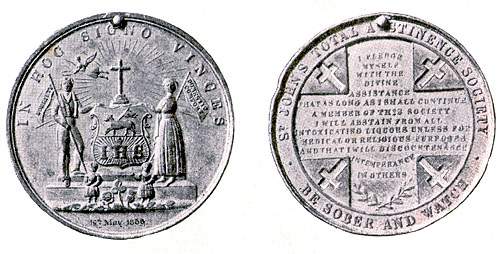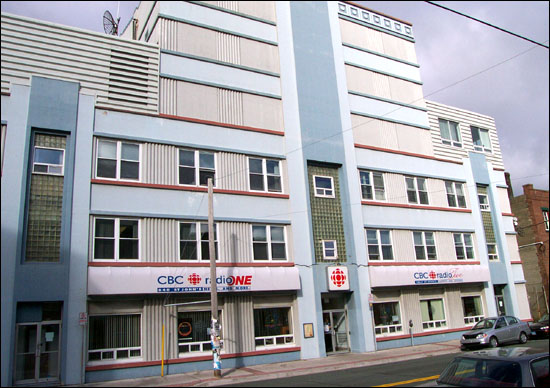Irish Fraternities in 19th and 20th Century St. John's: the Total Abstinence Society
The Irish Temperance movement was founded in Cork, Ireland in April 1838 by the "Apostle of Temperance" the Franciscan priest Father Theobald Mathew. In 1841 the movement was introduced to St. John's by Bishop Fleming's curate, the priest Kyran Walsh.

During the 1840s and into the 1860s, the Newfoundland Temperance Society and its successors, the Total Abstinence Society and the Total Abstinence and Benefit Society, became one of the most popular working class fraternal organizations in St. John's. Around 1842, the society issued a medal to its members, in silver, bronze, and white metal, depending on the level of adherence achieved. On one side was a farming scene with a ship, the ocean and the name of Bishop Fleming, the Society's president. On the other side was an image of St. John the Baptist preaching to a group of listeners, with the inscription, "For he shall be great in the sight of the Lord and shall drink neither wine nor strong drink." At about the same time, a Church of England temperance movement was also established.
In the context of Irish culture and politics, the Irish temperance movement in Newfoundland also became a political forum for lobbying for the repeal of the union of Ireland with Britain, particularly during the Repeal Year of 1843. By 1844, over 10,000 members had enrolled under the society's motto of "Be Sober and Watch", and had taken "the pledge" to abstain from alcoholic beverages and other iniquities. By 1850, the Temperance Society, reformed as the Total Abstinence Society (NTAS), had branches in Avalon Peninsula communities with substantial Irish populations, such as Torbay, Harbour Main, Brigus, and Harbour Grace. That year the NTAS issued a new medal bearing an image of a family and the mottoes "Sobriety" and "Domestic Comfort" on one side, and the name of the society and its president Fr. Kyran Walsh on the other, as well as the words of the famous "pledge" which members took: "I pledge myself with the Divine Assistance that as long as I shall continue a member of this Society I will abstain from all intoxicating liquors unless for medical or religious purposes and that I will discountenance intemperance in others."

From the 1860s until it burned in the St. John's fire of 1892, the Total Abstinence Society, now renamed the Total Abstinence and Benefit Society, used the Mechanics' Hall for its meetings. By the late 19th century, the society developed a substantial membership and social presence in St. John's. Its Cricket and Boating Club participated in the St. John's Regatta, and its band played at many civic functions. In the early 20th century, the society became renowned for its literary and musical events, and remained one of the most active and influential fraternal societies in St. John's until Confederation. The society's new hall on Duckworth Street in St. John's, built in the 1930s, was the largest Art-Deco style building erected in 20th century Newfoundland (it later served as the home of CBC Radio).

After Confederation interest waned, and by the early 1980s only a few members held meetings. By 1993 the society had become inactive.




